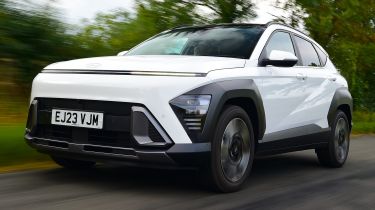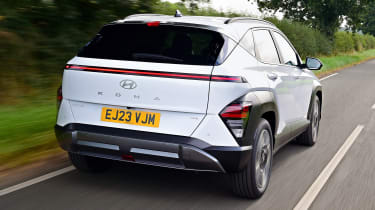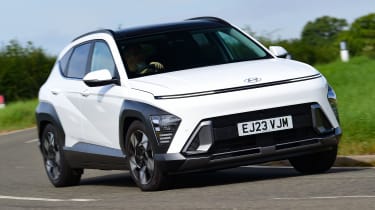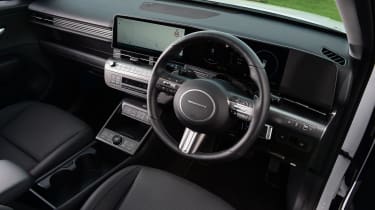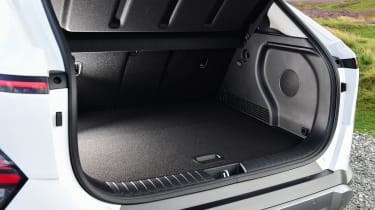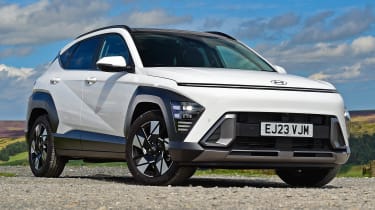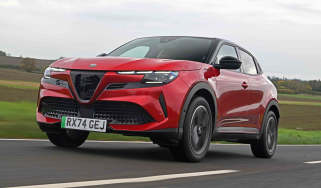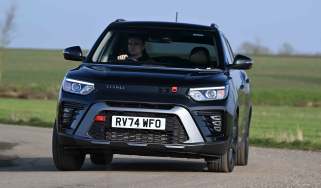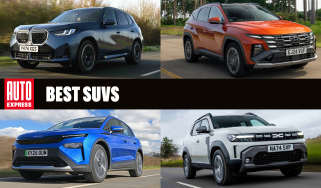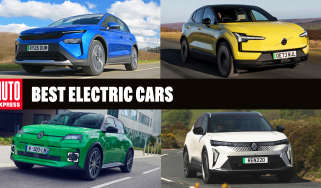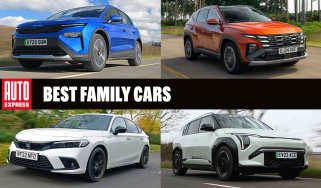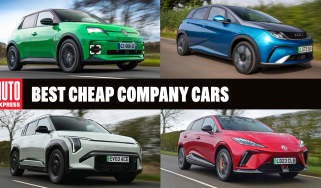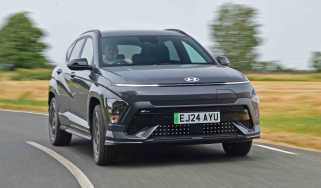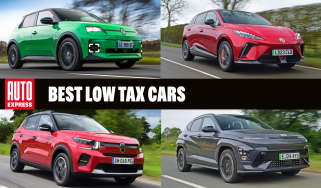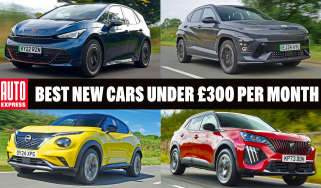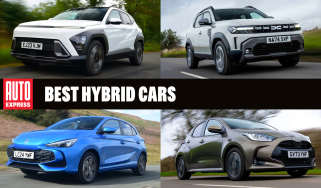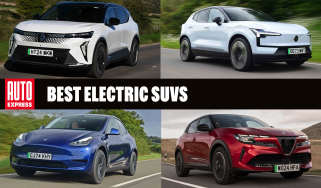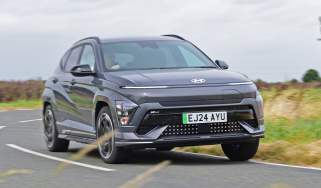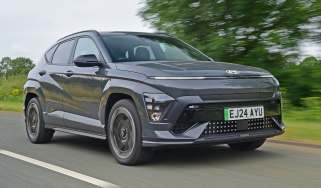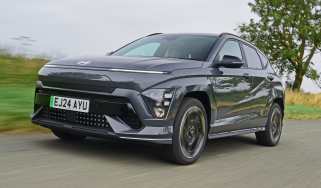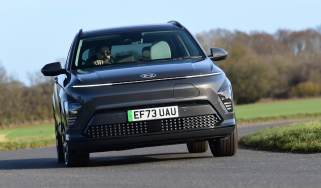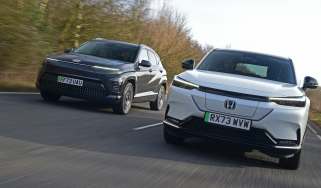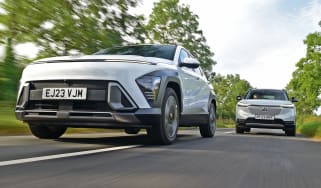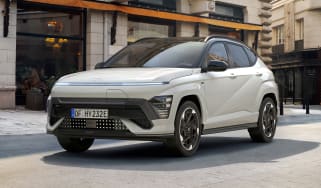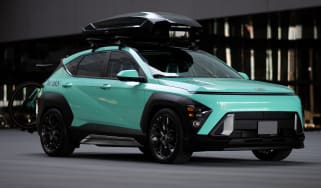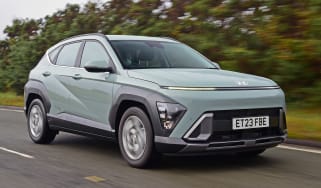Hyundai Kona review
The Hyundai Kona is comfortable, refined, spacious and overflowing with technology

The Hyundai Kona is a fantastic example of how a brand can listen to feedback and act upon it. Hyundai has grown its small SUV sensibly, delivering just enough additional practicality to satisfy those looking for their next family car. To go along with the extra space is a far more polished cabin compared with the original Kona. It’s smart looking, logically laid out, and features an intuitive infotainment system.
Admittedly, the daring, sci-fi-inspired styling might not be for everyone, and there are cheaper compact SUVs out there, but right now the Kona – and the Kona Electric in particular – looks extremely good value for such a mature, well equipped and well-rounded car. It’s one of many reasons why we continue to recommend the Hyundai Kona as our Small SUV of the Year.
Our choice: Hyundai Kona Electric Advance Comfort Pack
About the Hyundai Kona
The first Hyundai Kona arrived in 2018 and proved to be a big hit. Its funky styling certainly helped it stand out in the sea of small SUVs it was competing against, while the selection of petrol, hybrid and all-electric powertrains meant that there was a Kona to suit all tastes and almost every budget. There was even a fast version in the form of the Kona N. It had its flaws though, with the cramped rear cabin and relatively small boot being the things that irked us most.
Used - available now
However, when it came to developing its replacement, Hyundai says it listened carefully to feedback from Mk1 Kona owners, and it shows. The all-new, second-generation Hyundai Kona is bigger, more spacious, and more practical than the original, thanks in part to it being built on the larger K3 platform that’s also used by the latest Kia Niro.
The Kona may have grown in size, but its key rivals remain the cream of the crop in the small SUV and crossover segment. Among them are the Ford Puma, Jeep Avenger, Peugeot 2008, Renault Captur, Skoda Kamiq and Volkswagen T-Roc, plus the Kona’s Niro sister car. A few of these are also offered with a choice of combustion and electric power, in the case of the Niro, Avenger, and 2008.
The Kona has stuck with the same choice of powertrains as its predecessor, which means entry-level models are powered by either a 1.0-litre or 1.6-litre four-cylinder petrol engine that can be paired with either a six-speed manual gearbox or a seven-speed dual-clutch automatic.
Next up is the Kona Hybrid. It uses a 1.6-litre Atkinson-cycle four-cylinder petrol engine and a six-speed automatic, assisted by a single electric motor and a modest 1.32kWh battery. As this is a full-hybrid, you don’t have to plug it anywhere to charge, but fuel economy is improved over the regular petrol variants.
Sitting pretty at the top of the range is the Kona Electric. There are two versions available: the standard-range model is powered by a 48.4kWh (useable) battery that’s good for 234 miles on a single charge, while the long-range 65.4kWh (also useable) battery Kona Electric goes even further, with a claimed maximum range of 319 miles. Like the rest of the Kona line-up, the EVs are front-wheel drive.
Once you’ve picked the model you want, there’s also the matter of trim levels; entry-level Advance (the only option for the standard-range 48kWh Kona Electric), sportier-looking N Line and N Line S, plus range-topping Ultimate spec. Pricier trims add luxuries like leather upholstery, a sunroof and a Bose stereo, but even the base Kona is generously equipped with a 12.3-inch digital driver’s display, large central touchscreen, Apple CarPlay, Android Auto, alloy wheels, keyless entry, parking sensors for the front and rear, plus a reversing camera.
There are various option packs available too, such as the Comfort Pack for the entry-level Advance Kona Electric, which adds heated front and rear seats, and a wireless charging pad. Lux packs are offered on N Line S for petrol, hybrid and electric Konas, and on Ultimate versions of electric and Hybrid models. This pack adds ‘Premium Relaxation’ front seats, driver’s seat memory settings, and remote smart park assist.
Prices for the regular petrol Hyundai Kona start from just under £26,000, rising to more than £33,500 if you get the top-of-the-range version with the more powerful 1.6-litre motor and seven-speed DCT auto. The Kona Hybrid has a starting price just north of £30,000, but can rise to over £34,000 if you want all the goodies that come with Ultimate trim.
Finally, the standard-range Kona Electric currently starts at a fiver under £35,000. Upgrading to the long-range model, with its bigger batteries and extra range, adds £3,600 to the Kona Electric’s price tag, bringing it to nearly £38,600. Top-of-the-range models are priced at over £43,000.
Engines, performance and drive
The Hyundai Kona is a car that encourages you to take it easy when behind the wheel, and has been set up to be a comfortable family car rather than one that’ll set your trousers on fire. It’s happiest around town, where you can drive the Kona Hybrid and Kona Electric with just the accelerator thanks to one-pedal driving modes, recuperating energy and boosting the car’s efficiency.
Despite the new Kona being bigger in every physical dimension, it remains just as manoeuvrable as its predecessor, with a turning circle of 10.6 metres. The steering is so light that you can turn the wheel with one finger, which is a real boon when parking. The trade-off is virtually no feedback, though.
There’s plenty of suspension travel to help deal with less than perfect roads – which are not difficult to come across in the UK – and the ride itself is relaxing at pretty much any speed, being much softer than the firmer Ford Puma. That’s not to say that the Kona is so soft that it rolls onto its door mirrors when cornering, and overall, it handles in a very safe and predictable manner. It’s likely the 17-inch rims that feature on entry-level Advance-spec models (and are an option on Ultimate trim Kona Electric models to lessen rolling resistance and improve electric range) also contribute to the impressive ride quality we experienced, with the rest of the range riding on larger 18- or 19-inch wheels.
N Line and N Line S trim have more aggressive exterior styling, but don’t have any alterations made to the suspension to make them handle sharper, so these versions don't feel any different to drive than a bog-standard Kona – despite looking like they’re raring to pick a fight with a Ford Puma ST.
0-62mph acceleration and top speed
The 1.0-litre petrol Kona produces just 99bhp and 172Nm of torque, so it’s hardly surprising that it’s the slowest model in the range: it’ll ‘sprint’ from 0-62mph in 13.3 seconds, and go onto a top speed of 105mph. It’s not fast, but it’ll be sufficient for keeping up with traffic in town, and you can keep the engine on the boil using the standard six-speed manual gearbox with its pleasingly accurate and relatively short throw, which we found to be much more satisfying to use than the manual in the Nissan Juke.
The 1.6-litre petrol models produce a healthier 136bhp and 250Nm of torque – enough for 0-62mph in 10.2 seconds whether it's equipped with the seven-speed dual-clutch automatic or standard six-speed manual. The 1.6-litre petrol Kona also gets a higher top speed of 121mph. But, while the 1.6-litre motor packs a decent amount of punch that enables you to gather speed easily, we found that progress can be spoilt by the jerky dual-clutch automatic transmission, which never felt properly in tune with what the engine was doing. We suggest you’d be better off sticking with the manual with this engine.
The Kona Hybrid pairs a 1.6-litre petrol engine with a single electric motor, which work together to drive the front wheels. Combined, the set-up produces 127bhp and 265Nm of torque, which is good for 0-62mph in 12.0 seconds. However we found that after the initial pep of the electric motor, the petrol engine provides more noise than it does propulsion, and the acceleration tails off significantly once you go past 50mph. Once you’re at motorway speeds though, there’s still enough oomph available for overtaking.
Both versions of the Kona Electric use a single electric motor to drive their front wheels, but while standard-range models produce 154bhp, long-range cars have 215bhp on tap, although the torque output remains the same for both, at 255Nm. The additional power of the long-range Kona Electric helps overcome the extra weight of its heavier battery pack, giving it a one-second advantage over the standard-range model in the 0-62mph dash – 7.8 seconds vs 8.8 seconds.
As you’d expect from an EV, the Kona Electric’s motor delivers its torque instantly, and there’s enough power to make the Kona seem very nippy around town. It doesn’t feel quite as rapid when trying to accelerate at higher speeds, but there should be sufficient oomph in reserve to get past slower moving trucks without holding up anyone behind you.
MPG, CO2 and running costs
Like the original, the Mk2 Hyundai Kona is available with a choice of pure-petrol, full-hybrid or all-electric power. The 1.0-litre petrol Kona will return up to 47.9mpg and 135g/km on average. Meanwhile, 1.6-litre petrol Konas can average up to 45.6mpg and 141g/km when equipped with the manual or auto ‘box.
The Kona Hybrid pairs a 1.6-litre four-cylinder petrol engine and six-speed automatic transmission with an electric motor and pretty tiny 1.32kWh battery. Because this is a full-hybrid, not a plug-in hybrid (PHEV), you don’t charge the Kona Hybrid yourself; instead, the car recuperates energy when you slow down.
Hyundai says the Kona Hybrid will average 60.1mpg and 106g/km, which is higher than the hybrid Renault Captur, but a little below the 64.2mpg figure of the Toyota Yaris Cross. In our experience, if you’re just driving around town where the electric motor does a lot of the legwork, it’s possible to see more than 70mpg with very little effort. Cruising on the motorway at 70mph, we’ve seen the fuel economy figure drops to just over 50mpg.
Finally, there’s the Kona Electric. Standard-range models are powered by a 48.4kWh battery that’s good for a range of up to 234 miles, while long-range versions use a larger 65.4 kWh battery that boosts the compact electric SUV’s range to 319 miles – provided the car has 17-inch wheels. If you don’t pick the smaller 17in wheel option pack on the top-of-the-range Ultimate trim level, its standard 19-inch wheel reduce the range down to 282 miles. Every Kona Electric also comes with a heat pump, which means warming the cabin in the colder months shouldn’t eat up the range, as it does in EVs without one.
It’ll take just over six hours to fully recharge the standard-range Kona Electric’s battery using a typical 7.4kW home wallbox, or nearly nine hours for the long-range version with its bigger battery. But because long-range models also get a faster maximum charging speed (101kW vs 74kW for the standard-range car), it only takes 41 minutes to charge both from 10 to 80 per cent (going from roughly 30 miles of remaining range up to just over 255 miles of range) from a DC rapid charger.
Given that the Kona Electric produces no tailpipe emissions, it’s the cheapest to run as a company car, currently sitting in the two per cent Benefit-in-Kind (BiK) band until 2025: the petrol and hybrid versions will cost you a lot more.
Insurance groups
The petrol-powered Kona starts out in insurance group 16 (out of 50), climbing to group 18 for 1.0-litre models with the automatic, and up again to groups 25-28 for 1.6-litre models. The Kona Hybrid on the other hand sits in group 16 if you get the base Advance-spec model, or group 18 in any other trim. Finally, the 48kWh Kona Electric sits in insurance group 25, while the 65kWh Kona Electric lands itself in either group 31 or 33, depending on the trim level.
If you need a small SUV with lower insurance costs, consider either the SEAT Arona, which in entry-level 1.0 TSI SE form is in group nine, or if you’re after a hybrid, the Toyota Yaris Cross in 1.5 Icon trim is in group 11.
Depreciation
Our latest expert data suggests that the petrol and hybrid Kona models will retain between 51 - 53 per cent of their original value after three years and 36,000 miles of motoring, which is about the same as the Ford Puma is projected to hold onto. If you want a small SUV that retains its value even better, take a look at the Volkswagen T-Roc. In 1.5 150 Match trim, it’ll retain around 55 per cent of its value over the same period.
The Kona Electric isn’t expected to fare as well on the second-hand market, retaining 51 per cent of its value at best.
To get an accurate valuation on a specific model check out our valuation tool…
Interior, design and technology
It seems like Hyundai’s design team, with SangYup Lee (formerly of Bentley) at the helm, is on a mission to steal some of the thunder away from supercar owners, who have been hogging the limelight on the road for far too long. In just a few years, the brand has turned its range of sensible family SUVs and hatchbacks into a portfolio of some of the most dramatic, head-turning models on the market.
Among them are the latest Tucson SUV, Ioniq 5 and Ioniq 6 EVs, and the new Santa Fe seven-seater, which – whether you love their looks or not – stand out in hugely competitive segments. The Kona is the culmination of everything bold the brand has pulled off up to now; it combines the chiselled body lines and muscular arches of the Tucson with a futuristic front end and pixel lights, like those found on its Ioniq line-up.
The interior has been more heavily influenced by the Ioniq 5 hatchback and Ioniq 6 saloon. The dashboard is dominated by a dual-screen infotainment set-up – standard on every Kona – with three groups of physical climate controls and other shortcut buttons located below the centre touchscreen. Overall, the cabin feels bright, airy and spacious.
The pure-petrol and hybrid versions of the Kona are available in four trim levels – Advance, N Line, N Line S and Ultimate – while the Kona Electric only comes in Advance or Ultimate-spec.
Entry-level models get 17-inch alloy wheels (18-inch on hybrids), along with body-coloured door handles, mirrors, spoiler and skid plates. Inside you’ll find dual-zone climate control, a 12.3-inch instrument display, central touchscreen of 12.3 inches with sat-nav, Apple CarPlay, Android Auto, keyless entry, front and rear parking sensors, plus a reversing camera.
N Line trim gives the car a more sporty look, thanks to different front and rear bumpers, side skirts, 18-inch alloy wheels, black door mirrors and roof, plus body-colour wheelarches. Petrol and hybrid N Line models also get twin-exit exhaust tips, while the interior now features aluminium pedals, and heated N Line cloth seats front and rear. Extra kit includes Ambient lighting, a powered tailgate, heated steering wheel and a wireless smartphone charging pad.
Next up is the N Line S. This adds Alacantara and leather upholstered seats (heated and ventilated) with electric adjustable, three-zone air conditioning and a Bose sound system. N Line and N Line S models are also available with a two-tone roof.
Finally, sitting at the top of the Kona line-up is Ultimate trim. Range-topping models get a full-width daytime running light at the front, LED headlights, black leather seats, a sunroof and the Bose stereo.
A few optional extras are available, with the particular highlights being the Comfort pack on entry-level Advance Kona Electric models that adds heated seats all around, a heated steering wheel and wireless phone charging, or the Lux pack available on N Line S or Ultimate trims, which includes memory settings for the driver’s seat, and Hyundai’s ‘Premium Relaxation’ front seats that recline – a somewhat useful feature in the electric version that allows you to rest more comfortably while waiting for your car to charge when taking a long trip.
Sat-nav, stereo and infotainment
Every Kona features a 12.3-inch display behind the steering wheel paired with a 10.25-inch central touchscreen in petrol and hybrid models, while Kona Electrics feature another 12.3-inch display in the centre of the dash. The displays all look great and are fairly responsive, too.
The Kona also features the latest version of Hyundai’s infotainment system. The brand’s software was already one of the most intuitive and user-friendly set-ups we had tested, but the new system in the Kona is even better. For instance, the home page is now made up of large blocks, so finding the right menu is straightforward, but you can always use the physical shortcut buttons below the screen if you want. Alternatively, you can also use your favourite music and navigation apps via Apple CarPlay or Android Auto, which are standard-fit but not wireless.
Practicality, comfort and boot space
The original Hyundai Kona was not the most practical of small SUVs, but Hyundai listened to feedback from owners who requested more cabin space and a larger load bay. As a result, the second-generation model is significantly larger than its predecessor, having a longer wheelbase and considerably more space inside for luggage and passengers alike.
Charging everyone’s devices should be a doddle, because there are two USB-C ports in the rear, another two up front along with a 12V socket, with some models also featuring a wireless charging pad. We also like that there’s plenty of storage spaces dotted around the cabin, although we wish a couple more were covered in some way to help keep valuables out of sight.
Size
The Kona has grown in size for its second generation. The original Kona measured 4,205mm long, 1,800mm wide (2,070mm including door mirrors) and up to 1,568mm tall, while the Mk2 Kona is 4,350mm long, 1,825mm wide (2,100mm including door mirrors) and 1,585mm tall. The Kona’s wheelbase has also been stretched from 2,600mm to 2,660mm on the new model.
Leg room, head room & passenger space
The previous Kona offered about as much space inside as a supermini, but the new car’s cabin is far more spacious, offering ample room for five people. In fact, we found that the Kona now offers about the same knee and headroom as its bigger brother, the Hyundai Tucson mid-size SUV. The Tucson’s cabin is a little wider, which makes it better for carrying three adults in the rear, but otherwise there’s not much separating the two.
Two ISOFIX child seat mounting points are provided on the outer positions of the 2nd row seats.
Boot
There’s a whopping 466 litres of boot space available in the Hyundai Kona, which is even bigger than the already generous Skoda Kamiq, and puts the Kona on par with the very best in the small SUV class, with up to 1,300 litres of space available when the rear seats are folded down. Those rear seats fold in a highly versatile 40/20/40 split, which is something rarely found in the small SUV class and, even then, is generally the preserve of expensive premium brands.
While the latest Kona doesn’t feature a handy sliding rear bench seat like the Renault Captur to trade rear leg room for a bigger boot, nor the nifty underfloor storage box in the Ford Puma that can be easily washed out if you happen to put muddy hiking boots in it, the Kona has sheer size on its side.
Towing
The entry-level 118bhp petrol Kona has a maximum towing capacity of 1,200kg, but the 196bhp petrol and Kona Hybrid models can both haul up to 1,300kg. Neither figure is headline-grabbing, so if maximum towing capacity is what you’re after, consider a four-wheel drive ‘4Motion’ VW T-Roc. That can tow up to 1700kg in both 2.0-litre petrol and diesel forms.
The Kona Electric is even less capable, with only 300-750kg towing capacity, depending on the model.
Reliability and safety
The second-generation Hyundai Kona is too new to have made an appearance in our most recent Driver Power owner satisfaction survey, but its predecessor did manage to finish 16th on our list of the best cars to own, which is based on customers’ feedback from the survey. The new Kona’s sister car, the Mk2 Kia Niro, also came 60th.
Hyundai finished in the middle of the pack in our best car manufacturer rankings (also based on Driver Power survey results). The South Korean carmaker took 17th place, behind the likes of Kia (6th) and Peugeot (9th), but well ahead of more premium brands such as BMW (21st) and Mercedes (25th).
The Mk2 Kona received a disappointing four-star out of five rating from safety experts Euro NCAP when it was tested in 2023. The safety experts criticised structures behind the dashboard posing an injury risk, and that the driver slipped under the seatbelt in the frontal collision test (a scenario known as submarining), potentially causing damage to the knees and femur. However, it wasn’t the only SUV for fall fowl of the tougher test, because the Honda ZR-V also got four stars out of five, although the Honda did perform better than the Hyundai in child occupant and vulnerable road user protection, along with superior safety assistance score.
Every Kona is equipped with multiple airbags, driver attention warning, forward collision avoidance assist, lane keep and lane follow assist, tyre pressure monitoring, front and rear parking sensors, and a reversing camera. Any automatic petrol, hybrid, or electric Kona also gets adaptive cruise control with stop-and-go functionality, whereas all manuals come with regular cruise control.
N Line S and Ultimate spec also feature a rear cross traffic collision avoidance system to warn you of vehicles crossing your path – useful if you have to reverse on to a main road, blind spot monitoring to let you know of any vehicles alongside you on the motorway if you wish to change lanes, and a 360-degree camera system, among other kit.
Warranty
Whether you go for the petrol, hybrid or electric Kona, it’ll be covered by the same five-year, unlimited-mileage warranty as all new Hyundais. It might not be the longest standard cover – for instance, Kia and MG both provide seven-year warranties, while Toyota offers up to 10 years of cover (provided you have you car serviced at a franchised Toyota dealer annually). You also get 12 months’ free roadside assistance and annual health checks of your car for up to five years.
Electric versions of the Kona also come with a separate eight-year/100,000-mile guarantee for the battery pack.
Servicing
Hyundai offers flexible servicing plans designed to meet your individual needs. Prices are based on the model of car, expected mileage and how long you want the plan to cover. You can pay for the entire service plan in one lump sum, or spread the cost with flexible payment. Plus you have the ability to cancel a plan at any time.
Hyundai Kona Electric Ultimate long-term test
Our art director, Darren Wilson, ran a Hyundai Kona Electric for six months and from day one he was constantly reminded why this small SUV was our 2023 Car of the Year. The Kona’s easy-to-use technology, generous helping of safety equipment and practical layout all made a very positive and lasting impression.
Darren also loved the way the Kona looks, which was no doubt helped by the fact the car was designed and engineered as an EV before anything else. A downside? Colder temperatures resulted in a range drop from over 300 miles to around 240 miles. You can read the full long-term test here…
Frequently Asked Questions
We made the Hyundai Kona our 2023 overall Car of the Year, and we continue to recognise it as our 2024 Small Company Car of the year.
